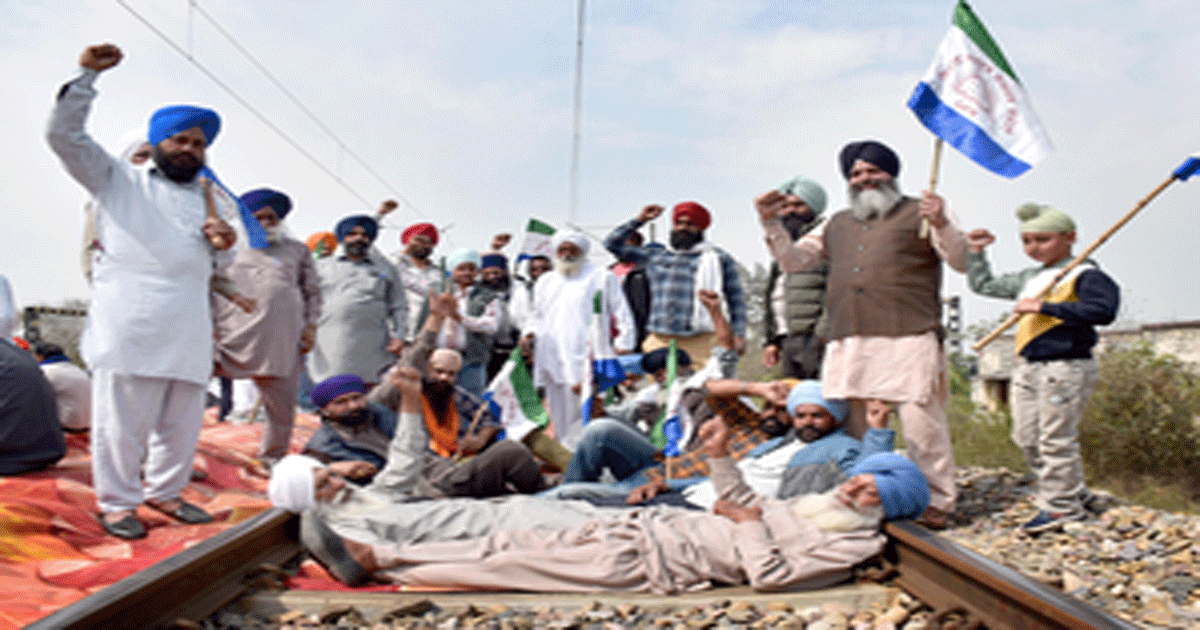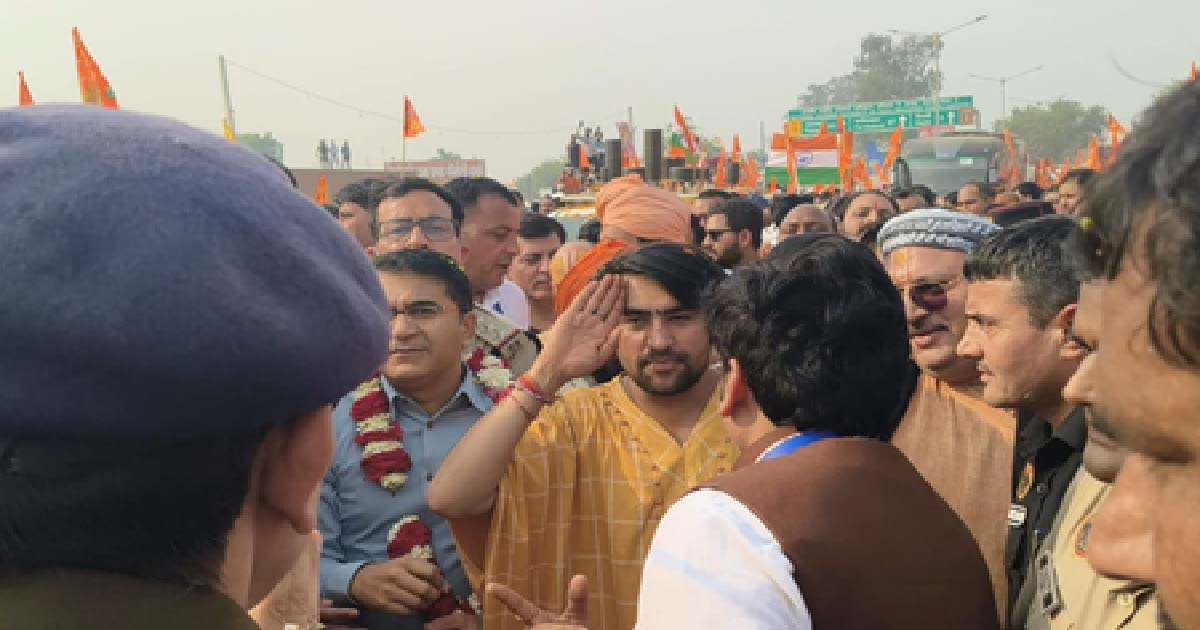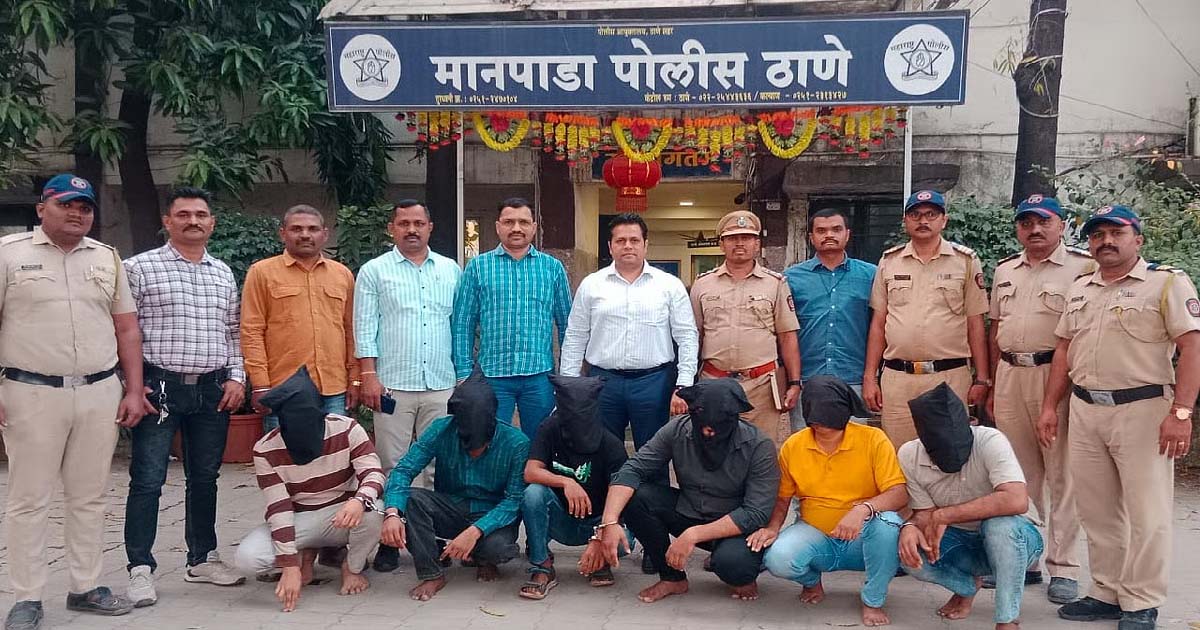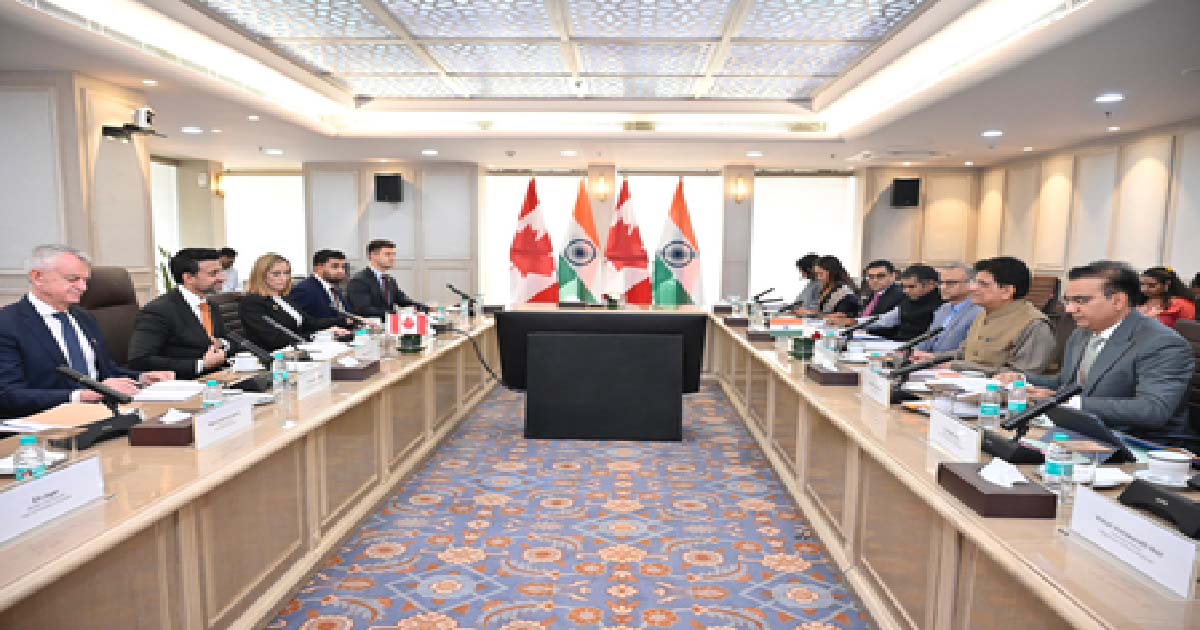National News
Passengers may face inconvenience with ‘Rail Roko’ protest in Punjab

Chandigarh, Dec 18: Protesting farmers, whose bid to enter Haryana in support of their long-pending demands was foiled thrice, will halt trains in Punjab on Wednesday to lodge their protest and press their demands for a legal guarantee for Minimum Support Price (MSP) for crops among other things.
A group of 100 farmers’ representatives who were going to New Delhi to press their demands were recently stopped by the Haryana Police by bursting teargas shells and water cannons and this latest bid to halt trains in Punjab to lodge their protest is bound to lead to more trouble even as passengers are expected to face inconvenience.
Farmer leader Sarwan Singh Pandher announced that activists of the Samyukt Kisan Morcha (Non-Political) and the Kisan Mazdoor Morcha would block rail traffic from 12 noon to 3 P.M. on Wednesday.
He urged the protesting farmers to avoid isolated railway tracks and assemble at railway stations only in their respective villages, towns and cities for the ‘Rail Roko’ protest.
Punjab Director General of Police (DGP), Gaurav Yadav, along with Union Ministry of Home Affairs Director, Mayank Mishra, on Sunday met farmer leader Jagjit Singh Dallewal, who is on a fast unto death to press the Centre in support of the growers’ demands, enquired about his health and requested him to end his fast that entered the 23rd day.
This has been the first meeting between the Union government and a farmer leader since talks with farmers remained inconclusive in February.
The 70-year-old cancer patient Dallewal has been fasting at Khanauri, the border point between Punjab and Haryana, since November 26 in support of their demands that comprised loan waiver and reforms to improve conditions in the agricultural sector.
After meeting the farmer leader, Yadav had told the media, “We came to enquire about the health of Dallewal.”
Without mincing words, he had said, “We have heard whatever his (Dallewal) demands are. There was no proposal of any kind (over the demands). I came here to hear him and also for implementation of the Supreme Court order.”
DGP Yadav had said, “We have appealed to Dallewal that the government has taken note of his situation, and the Punjab government has said that they will talk to Dallewal and his associates and provide them with medical assistance.”
Despite assurances by the government officials, fasting farmer Dallewal remained adamant on continuing with the fast unto death, farmer leaders said.
Doctors have advised immediate hospitalisation of Dallewal as due to the prolonged fast he turned weak.
Haryana Agriculture and Farmers’ Welfare Minister Shyam Singh Rana this week said that Punjab Chief Minister Bhagwant Mann should follow his Haryana counterpart and promptly resolve the issues of protesting farmers.
“Since the Haryana Chief Minister is providing MSP on all crops, the Punjab government should also follow the Haryana government’s policy in the interest of Punjab’s farmers,” the Agriculture Minister said in a statement on Monday.
On the farmers’ call to resume the Delhi march, the minister said Punjab and Haryana are the biggest producers of foodgrains for the central pool and farmers of both states were getting the benefit of MSP. He said the Punjab government should also ensure that all farmers of Punjab could sell their produce on MSP like they do in Haryana. The Punjab Chief Minister should play his role and come forward to talk to the farmers so that they can return to their homes.
The minister said the Supreme Court had already formed a committee of experts to resolve this issue but the farmer leaders did not attend the meeting with the committee appointed on this matter.
National News
During Sanatan Yatra, Dhirendra Shastri’s salute to ASP Anuj Chaudhary wins hearts in Mathura

Mathura, Nov 13: Chief Priest of Bageshwar Dham, Dhirendra Krishna Shastri, entered the holy city of Mathura on Thursday as part of his ongoing ‘Sanatan Ekta Padyatra’.
This padyatra is a journey aimed at spreading the message of Hindu unity and underscoring the importance of Sanatan Dharma.
The march, now in its seventh day, received a grand welcome at every stop from the UP-Haryana border to Mathura, with devotees showering flowers and chanting ‘Jai Shri Ram’.
Before entering Mathura, Shastri reportedly felt unwell at the UP-Haryana border and had to rest briefly by the roadside. However, showing remarkable determination, he resumed the journey after eating a simple meal of pickles and ‘parathas’.
A salute to ASP Anuj Chaudhary
A heartwarming moment was witnessed in Mathura when Shastri noticed the efficient security arrangements led by Additional Superintendent of Police (ASP) Anuj Chaudhary. Shastri was impressed by the alertness and discipline of the police team providing security. As a result, Shastri personally saluted ASP Chaudhary. It was seen as a gesture of mutual respect and harmony between spiritual leaders and law enforcement.
The padyatra is set to cover approximately 55 kilometres in the Mathura region over the next four days. In order to manage the massive crowds of devotees and the entire Yatra, elaborate security measures have been put in place, and police personnel are doing a tremendous job.
Mathura city witnessed scenes of devotion and festivity as devotees dressed as Hanuman, tableaux depicting Lord Rama and Sita were seen on the road, and continuous chants reverberated through the streets.
During his address, Shastri referred to the Delhi blast, strongly condemning violence. He assertively said, “We don’t want riots, we want Ganga – purity and peace.”
He also appealed to religious leaders to inspire children to become visionaries like Dr A. P. J. Abdul Kalam.
Crime
Thane Police Crack Dombivli Bar Murder Case Within 24 Hours, Arrest Six Accused After Film-Style Chase In Nashik

Dombivli: In a shocking incident, a 38-year-old man was brutally murdered following a minor altercation outside a bar in Dombivli MIDC area. The Manpada Police cracked the case within 24 hours and arrested six accused from Nashik after a dramatic, film-style chase through narrow lanes.
The arrested accused have been identified as Amar Rajesh Mahajan (36), Akshay Kumar Shankar Waghle (26), Atul Balu Kamble (24), Nilesh Madhukar Thosar (42), Prateek Singh Prem Singh Chauhan (26), and Lokesh Nitin Chaudhary (24).
The incident took place around 12:15 a.m. on Sunday, November 9, near the entrance of Malvan Kinara Bar and Restaurant in the MIDC Phase 2 area. The victim, Akash Bhanu Singh (38), was stabbed to death following a dispute over an accidental push.
According to the complaint filed by Akash’s younger brother, Badal Singh, who works at a call center in Navi Mumbai, Akash had gone to the bar with his friends for dinner. As they entered, Akshay Waghle accidentally brushed against him. Although Akash apologized and explained it was unintentional, Waghle became aggressive, assaulted him, and threatened to kill him.
Soon after, Waghle called his associates to the spot. The six accused dragged Akash out of the bar, brutally assaulted him on the road, and stabbed him multiple times, killing him on the spot. When Sunil Kagale, a bystander, tried to intervene, the gang attacked him with knives as well leaving him injured.
The case posed a major challenge for police, as there were no immediate clues or CCTV evidence from the crime scene. However, under the supervision of Deputy Commissioner of Police Atul Jende, Assistant Commissioner of Police Suhas Hemade, and Senior Police Inspector Sandipan Shinde, the Manpada police team launched an intensive investigation.
A team led by Assistant Police Inspectors Sampat Phadol, Mahesh Rale-bhat, and Sagar Chavan used technical surveillance and local informants to trace the accused to Nashik. Acting on a tip-off, police teams coordinated with Nashik City Police and raided multiple locations. On seeing the police, the accused tried to flee, but officers chased them down in a cinematic-style pursuit through the streets and successfully arrested all six.
Thane Police Commissioner Ashutosh Dumbre commended the Manpada Police team for their swift action and exemplary investigation that led to solving the murder case within 24 hours.
Business
India, Canada discuss ways to boost bilateral trade, promote investments

New Delhi, Nov 13: Commerce and Industry Minister Piyush Goyal and Maninder Sidhu, Canada’s Minister of International Trade, discussed ways to further boost bilateral trade and promote investments, it was announced on Thursday.
Sidhu is in India to find opportunities to advance trade and investment linkages between the two nations.
“It was a pleasure to co-chair the 7th India-Canada Ministerial Dialogue on Trade and Investment as part of the New Roadmap 2025 along with @MSidhuLiberal, Canada’s Minister of International Trade,” Goyal posted on the X social media platform.
The minister further stated that they discussed “avenues to strengthen bilateral trade, promote investments and deepen cooperation between our countries”.
During his India visit, Sidhu is set to promote Canada’s commitment to supporting and growing the well-established commercial ties shared by Canada and India, including artificial intelligence, clean technology and digital industries, and explore new opportunities for partnerships that benefit workers and businesses in both countries.
“This visit to India will reinforce Canada’s commitment to diversifying our trade relationships and attracting new investment,” an official statement quoting Sidhu said. “As one of the fastest-growing major economies, India offers significant opportunities for Canadian businesses and workers. Our commercial ties continue to expand — bilateral trade surpassed $30 billion in 2024 — and there is even greater potential ahead,” the statement added.
India is a key partner as Canada strengthens its economic links in the Indo-Pacific region under a comprehensive strategy for the region. In 2024, India was Canada’s seventh-largest goods and services trading partner, with two-way trade valued at $30.9 billion.
Meanwhile, External Affairs Minister (EAM) S. Jaishankar and his Canadian counterpart, Anita Anand, held discussions on strengthening cooperation across key sectors, including trade, energy and security. Both leaders met on the sidelines of the G7 Foreign Ministers’ Meeting in Niagara.
EAM Jaishankar also praised the progress made under the New Roadmap 2025, aimed at enhancing bilateral ties between India and Canada and expressed hope for rebuilding a stronger partnership.
-

 Crime3 years ago
Crime3 years agoClass 10 student jumps to death in Jaipur
-

 Maharashtra1 year ago
Maharashtra1 year agoMumbai Local Train Update: Central Railway’s New Timetable Comes Into Effect; Check Full List Of Revised Timings & Stations
-

 Maharashtra1 year ago
Maharashtra1 year agoMumbai To Go Toll-Free Tonight! Maharashtra Govt Announces Complete Toll Waiver For Light Motor Vehicles At All 5 Entry Points Of City
-

 Maharashtra1 year ago
Maharashtra1 year agoFalse photo of Imtiaz Jaleel’s rally, exposing the fooling conspiracy
-

 National News1 year ago
National News1 year agoMinistry of Railways rolls out Special Drive 4.0 with focus on digitisation, cleanliness, inclusiveness and grievance redressal
-

 Maharashtra12 months ago
Maharashtra12 months agoMaharashtra Elections 2024: Mumbai Metro & BEST Services Extended Till Midnight On Voting Day
-

 National News1 year ago
National News1 year agoJ&K: 4 Jawans Killed, 28 Injured After Bus Carrying BSF Personnel For Poll Duty Falls Into Gorge In Budgam; Terrifying Visuals Surface
-

 Crime1 year ago
Crime1 year agoBaba Siddique Murder: Mumbai Police Unable To Get Lawrence Bishnoi Custody Due To Home Ministry Order, Says Report












